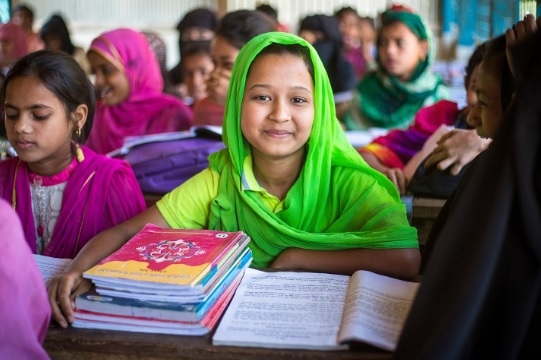“It is time to make refugee girls’ education a priority” says UNHCR

A new report by UNHCR titled ‘Her Turn’ reveals that refugee girls are half as likely to enrol in secondary school as their male peers.
Despite access to education being recognised as a human right refugee children often face a number of obstacles that make it much harder for them to enrol in school than their non-refugee peers. This is particularly difficult for girls who can struggle to find and keep their place in a classroom.
As refugee girls get older they face increasing marginalisation and the gender gap widens.
Around the world only 61% of refugee children have access to primary education compared to the international average of 91%, at secondary level only 23% of refugees attend school, compared to 84% globally.
Filippo Grandi, UN High Commissioner for Refugees commented:
“It is time for the international community to recognize the injustice of denying refugee girls and women an education…these findings are a global wake-up call, and I urge all to join us in demanding: ‘It’s her turn’.”
The UNHCR’s report highlights that social and cultural traditions often prioritise the enrolment of boys in school.
The situation is exacerbated for girls as refugees often do not have access to menstrual supplies and are forced to attend schools with inappropriate toilet facilities.
Filippo Grandi added:
“Finding solutions to the challenges refugee girls face as they strive to go to school requires action right across the board – from national education ministries to teacher training institutions, in communities and classrooms”
“There are formidable barriers to overcome. We are calling for an international effort to turn the tide.”
The ‘Her Turn’ report highlights a number of effective and realistic policies and actions that will enable more refugees to receive a quality education. These include explaining the importance of refugee adults in supporting their families and the risks girls can face on the way to school.
In addition, the report emphasises the need to recruit and train more female teachers within host and refugee communities to promote best practice and protect against behaviour that discourages girls from attending school.
Filippo Grandi reflected on the long term benefits of educating women, such as leadership, entrepreneurship and resilience:
“If we continue to neglect refugee girls’ education, it is evident that the consequences will be felt for generations,”
“It is time to make refugee girls’ education a priority.”
If you’d like to stay informed on the latest updates in aid and development, please sign up for the AIDF newsletter.
Photo credit: UNHCR/Roger Arnold















